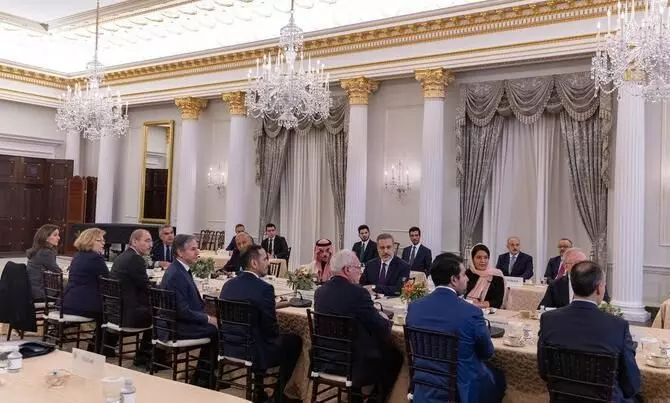
Arab nations voice rejection of US' veto against ceasefire in Gaza
text_fieldsSaudi Press Agency photo.
Riyadh: Following the United States veto, blocking international calls for the UN Security Council to demand to cease fire in Gaza, the Arab-Islamic nations raised their objection to the US's move, Arab News reported.
The Arab-Islamic Ministerial Committee told US Secretary of State Anthony Blinken that the US must assume its responsibilities and take steps to push Israel to an immediate ceasefire.
At a meeting with Blinken, the foreign ministers unanimously rejected the Israeli offensive against the Palestinians in Gaza. They reiterated the importance of ending hostilities and protecting civilians in the war-torn land. They pointed out that the siege is hindering the supply of humanitarian aid for a war-stricken population.
They further expressed their strong objection to Israel's attempt to displace Palestinians from Gaza. Saudi Press Agency said in a statement that the ministers emphasised creating a political climate that culminates into a two-state solution.
The meeting with Blinken hosted many ministers, including the Prime Minister and Minister of Foreign Affairs in Qatar, Sheikh Mohammed bin Abdulrahman Al Thani, Jordan's Deputy Prime Minister and Minister of Foreign Affairs and Expatriates Ayman Al-Safadi, Egypt's Minister of Foreign Affairs Sameh Shoukry, Palestinian Minister of Foreign Affairs and Expatriates Riyad Al-Maliki, and Turkish Minister of Foreign Affairs Hakan Fidan.
After the war started on October 7, there was a truce for seven days, which was the fruit of efforts by Egypt and Qatar. The days of truce allowed the supply of humanitarian aid. However, alleging a violation of the truce by Hamas, Israel resumed combat operations in Gaza. Israel alleged that Hamas fired into their state, breaking the truce agreement, and thus, the seven-day ceasefire ended.
















